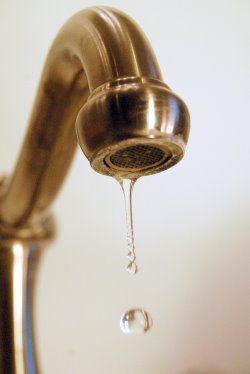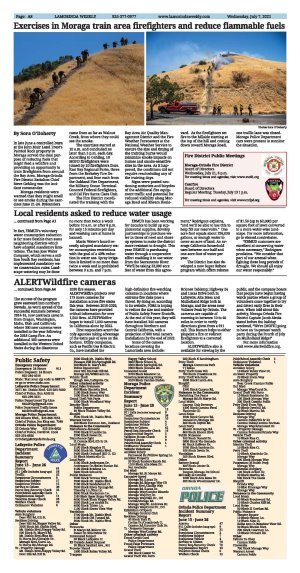| | Published July 7th, 2021
| Local residents asked to reduce water usage
| | | By Diane Claytor |  | | bigstock images |
As if more than a year of a pandemic and staying home wasn't enough, Lamorinda residents now find themselves in the midst of a drought brought on because, according to East Bay Municipal Utility District Board President Doug Linney, we just ended "the driest year on record in the East Bay." As of July 1, precipitation was 51% of average and the total water storage system is only 63% full. For those reasons, in April, EBMUD's board declared a Stage-1 drought shortage and requested that customers voluntarily reduce water consumption by 10%.
 Because of previous drought declarations, EBMUD customers have grown accustomed to conserving water. In fact, the agency happily states that compared to water use at the beginning of the last serious drought in 2013, East Bay residents are already using 13% less water.
Because of previous drought declarations, EBMUD customers have grown accustomed to conserving water. In fact, the agency happily states that compared to water use at the beginning of the last serious drought in 2013, East Bay residents are already using 13% less water.
 With a possible four stages, Stage 1 is the lowest level drought and a voluntary 10% reduction in water consumption should be quite easy to achieve. Some recommendations from EBMUD:
With a possible four stages, Stage 1 is the lowest level drought and a voluntary 10% reduction in water consumption should be quite easy to achieve. Some recommendations from EBMUD:
 ? Landscape watering should be done only three times or less a week at dawn or dusk.
? Landscape watering should be done only three times or less a week at dawn or dusk.
 ? Check irrigation systems, faucets, showers and toilets for leaks. (According to Nelsy Rodriguez, EBMUD public information representative, during the last drought, leaky toilets accounted for thousands of wasted gallons of water.)
? Check irrigation systems, faucets, showers and toilets for leaks. (According to Nelsy Rodriguez, EBMUD public information representative, during the last drought, leaky toilets accounted for thousands of wasted gallons of water.)
 ? Only run the dishwasher and washing machine with full loads.
? Only run the dishwasher and washing machine with full loads.
 ? Turn off the water while brushing your teeth, washing your face, shampooing your hair, shaving. "If you don't actively need water, don't use it," Rodriguez suggests.
? Turn off the water while brushing your teeth, washing your face, shampooing your hair, shaving. "If you don't actively need water, don't use it," Rodriguez suggests.
 ? Replace non-native plants and lawns with native, drought-tolerant plants. "Now's the time to do this," Rodriguez says, noting that there are many beautiful native plants that don't need water. "This is the time to let thirsty landscape die off and then in the fall, when the rains hopefully return, plant natives so mother earth can give the organic water back to the plants."
? Replace non-native plants and lawns with native, drought-tolerant plants. "Now's the time to do this," Rodriguez says, noting that there are many beautiful native plants that don't need water. "This is the time to let thirsty landscape die off and then in the fall, when the rains hopefully return, plant natives so mother earth can give the organic water back to the plants."
 In warmer climates, such as we enjoy in Lamorinda, Rodriguez reminds that it's especially important to water either early in the morning or later in the evening, when evaporation is less. She also notes that drip irrigation is more conservation-friendly than spraying with a hose.
In warmer climates, such as we enjoy in Lamorinda, Rodriguez reminds that it's especially important to water either early in the morning or later in the evening, when evaporation is less. She also notes that drip irrigation is more conservation-friendly than spraying with a hose.
 Rodriguez states EBMUD believes we'll remain in Stage 1 drought through the summer and doesn't anticipate mandatory rationing, additional conservation requirements or drought surcharges at this point. "We won't know for sure how robust our water supply is until the end of the next rain year, which runs from October through April or May," she reports.
Rodriguez states EBMUD believes we'll remain in Stage 1 drought through the summer and doesn't anticipate mandatory rationing, additional conservation requirements or drought surcharges at this point. "We won't know for sure how robust our water supply is until the end of the next rain year, which runs from October through April or May," she reports.
 EBMUD does have water and, Rodriguez says that it's in a strong position compared to many other agencies. In fact, EBMUD's voluntary water consumption reduction is far more flexible than some neighboring districts which have adopted mandatory limitations. The San Jose Water Company, which serves a million South Bay residents, has implemented mandatory water conservation rules: Landscape watering may be done no more than twice a week before 10 a.m. or after 8 p.m. for only 15 minutes per day and washing cars at home is banned.
EBMUD does have water and, Rodriguez says that it's in a strong position compared to many other agencies. In fact, EBMUD's voluntary water consumption reduction is far more flexible than some neighboring districts which have adopted mandatory limitations. The San Jose Water Company, which serves a million South Bay residents, has implemented mandatory water conservation rules: Landscape watering may be done no more than twice a week before 10 a.m. or after 8 p.m. for only 15 minutes per day and washing cars at home is banned.
 Marin Water's board recently adopted mandatory water consumption restrictions with the goal of a 40% reduction in water use. Spray irrigation is limited to no more than twice a week and is prohibited between 9 a.m. and 7 p.m.
Marin Water's board recently adopted mandatory water consumption restrictions with the goal of a 40% reduction in water use. Spray irrigation is limited to no more than twice a week and is prohibited between 9 a.m. and 7 p.m.
 EBMUD has been working for decades to build up supplemental supplies, develop partnerships to purchase water in times of need and shore up systems to make the district more resistant to drought. This year EBMUD is purchasing water through a cooperative effort enabling it to use water from the Sacramento River. "We'll be taking 33,000 acre feet of water from this agreement," Rodriguez explains, "and we'll be able to use this to help fill our reservoirs." One acre-foot equals about 326,000 gallons, or enough water to cover an acre of land. An average California household uses between one-half and one-acre-foot of water per year.
EBMUD has been working for decades to build up supplemental supplies, develop partnerships to purchase water in times of need and shore up systems to make the district more resistant to drought. This year EBMUD is purchasing water through a cooperative effort enabling it to use water from the Sacramento River. "We'll be taking 33,000 acre feet of water from this agreement," Rodriguez explains, "and we'll be able to use this to help fill our reservoirs." One acre-foot equals about 326,000 gallons, or enough water to cover an acre of land. An average California household uses between one-half and one-acre-foot of water per year.
 The District has also developed a new Super Rebate program which offers rebates of $1.50 (up to $2,000) per square foot of lawn converted to a more water-wise landscape. For more information, go to ebmud.com/rebates.
The District has also developed a new Super Rebate program which offers rebates of $1.50 (up to $2,000) per square foot of lawn converted to a more water-wise landscape. For more information, go to ebmud.com/rebates.
 "EBMUD customers are excellent at conserving water when necessary," Rodriguez proclaims. "We consider that part of our arsenal when fighting these long periods of drought. We should all enjoy our water responsibly."
"EBMUD customers are excellent at conserving water when necessary," Rodriguez proclaims. "We consider that part of our arsenal when fighting these long periods of drought. We should all enjoy our water responsibly." |
| | | | | | | | | | | | |




